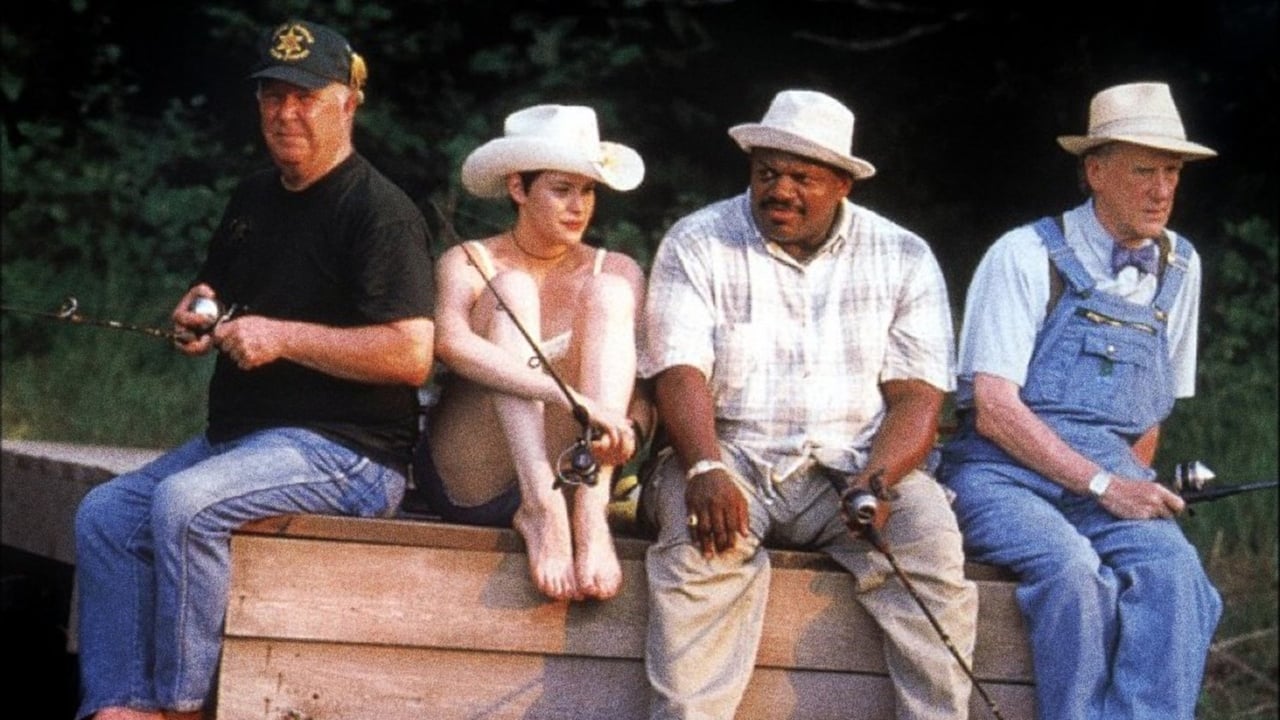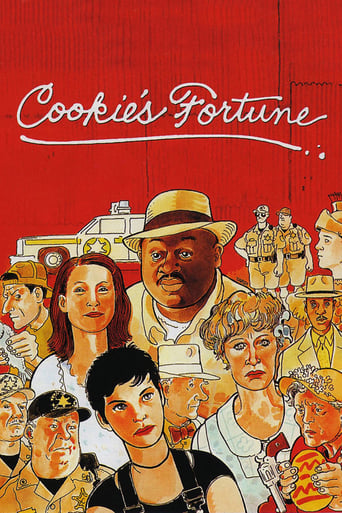



the leading man is my tpye
Surprisingly incoherent and boring
It is interesting even when nothing much happens, which is for most of its 3-hour running time. Read full review
View MoreThe best films of this genre always show a path and provide a takeaway for being a better person.
View MoreI watched Cookie's Fortune because of the cast and director. I've always had mixed feelings about Robert Altman but have mostly enjoyed his movies. Aside from Hitchcock, or maybe Scorsese, I tend to view each of a director's movies individually rather than judging it against his/her oeuvre. I truly enjoyed this movie and was especially happy to see (or rather hear, because she was pretty much unrecognizable)Patricia Neal, who played her role with sensitivity and believability. So did the rest of the actors with the exception of Glen Close who veered towards caricature in every scene. The minute she appeared I winced, and continued to do so throughout the movie. Aside from that and despite the confusing "revelation of secrets" at the end (which seemed rushed and forced,)I loved this movie because of the atmosphere of the town, the acting, and the writing which was often laugh-aloud funny. I would recommend this movie to anyone who needs their spirits lifted by some light entertainment with a rueful and forgiving view of community.
View MoreOne might call Cookie's Fortune a 'minor' effort from Robert Altman, a filmmaker who once commented that each film "is all part of the same picture", or rather one long movie with bits and pieces making up a career whole. But it has enough going for it through its very competent cast and interesting script to keep it afloat from being the kind of small film little old ladies might watch on TV during the day. In that sense it isn't as 'heavy' as some of Altman's other work. It is also cool enough to treat the subject of a mystery around a suicide with enough humanity to make some scenes smile-worthy. Considering some of the darker elements in the script, Altman depicts this to the point where- get this- Cookie's Fortune is sometimes shown on the HBO family channel! Is it really a kid's film? I'm not sure, but it isn't work for only one age group- its appeal from its cast of a collective of small towners is appealing to most in the audience. That the cast- Glenn Close, Liv Tyler, (especially) Charles S. Dutton, even Chris O'Donnell- gels and plays some of the dialog sincerely even when its meant to not be taken seriously at all, is a credit to the filmmaker. That it also might not be quite as memorable as some of the director's major films is and is not a fault. It is a fault because the subject matter is sort of stuck in a certain genre realm. It is not because the subject mater is also very much more intelligent than would be expected at times. I was also fond of certain scenes and interactions with the actors, the rhythm of it all, like early on with Dutton and the actress Patricia Neal who plays the old lady. I also really like the climax. So it's a good work about the rumblings and eccentricities of a small town, the good in people as well as the lesser parts, and parts of greed and death seen through a light that is not aiming for anything 'cheap', so to speak.
View MoreEver since I've seen "Gosford Park" I'm convinced that Robert Altman has some real talent. The only Altman movie that I had seen before that one was "Prêt-à-Porter", at least a part of it, but enough to know that I didn't like it. So when I got the chance to see this movie with the interesting title "Cookie's Fortune", I gave it a try. I thought that this would be a comedy about a Chinese restaurant or something (The only thing that I knew before taping it, was that it was a comedy from Robert Altman, that's where my confusion comes from). It had nothing to do with what I thought, but I liked it nevertheless...Jewel Mae "Cookie" Orcutt is an older lady who lives in a small town, called Holly Springs. All the residents are peaceful, kind folk, except for her niece Camille Dixon. Cookie is a widow for several years now, but she isn't alone. Willis Richland does all her shopping and helps her wherever he can. But she is tired of living without her husband and she wants to die. She commits suicide, but when the irritating and pushy Camille discovers what her aunt has done, she decides to cover up the real story, convinced that this will have a bad influence on the good family name. Together with her shy younger sister Cora, whose estranged daughter Emma as just returned to town, she tries to make it all look like a robbery and murder. To do so, she eats the suicide note, hides the gun in the bushes and shatters some windows. The police is convinced that the murder story is true and they start looking for a suspect, Willis. Although the rest of the town is convinced Willis didn't commit the crime, an outside investigator isn't so sure. But as the truth comes out, more secrets are revealed than everybody thought existed in this quiet town...I guess it's the combination of the rather naive looking people in the town, the nice story and the fine acting that makes this movie work. Of course you expect to see some nice performances from people like Glenn Close, Julianne Moore, Liv Tyler,... but in my opinion it was Charles S. Dutton who was the most surprising of them all. He has already played some minor roles in well known movies like "Alien³" and "Se7en", but it was the first time that I saw him in major role and I must say that I liked it.Overall, this may not be the most original movie, but it is a nice comedy and I had some good laughs with it. Sure, it is a bit stereotypical, but that's not bad. It's a comedy and well-used stereotypes are always funny to watch. Add to this some fine acting and a nice story and what you get is a comedy that certainly deserves to be seen. I give it a 7/10.
View MoreSome good acting, some interesting subplots, but a banal main story makes this film something near nadir, If you like actors doing their thing, and you don't care about interesting plots, then this is your kind of movie, but in any other case just skip it.Of the actors, I liked specially Patricia Neal, Glenn Close was a little too much 'theatrical' and people like Lyle Lovett, Chris O' Donnel and Liv Tyler were just ok. Julianne Moore was as good as ever.The ending leaves me with a bitter taste in my mouth, maybe because the characters didn't seem real, or either because the improbable plot, I don´t know...
View More